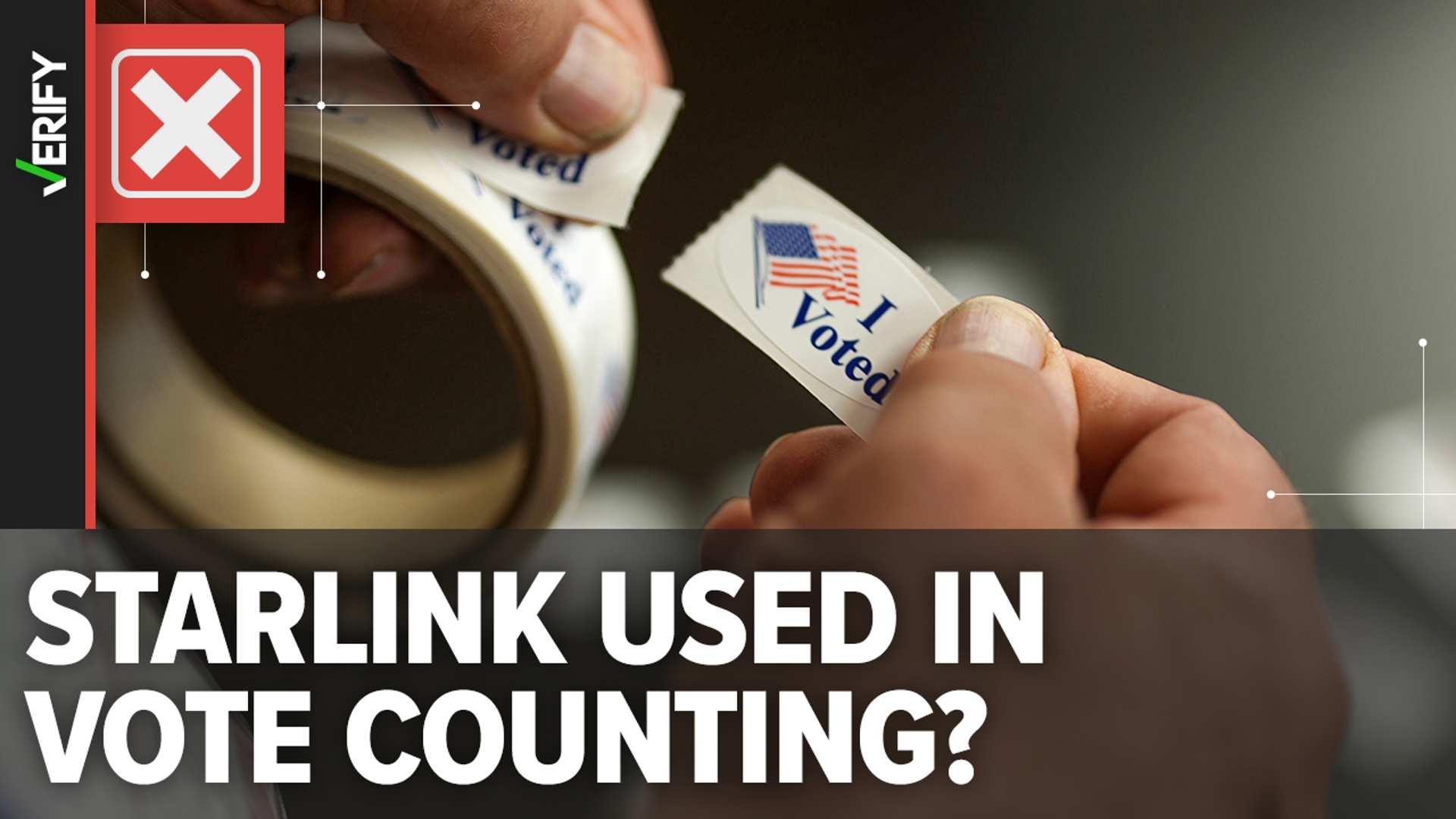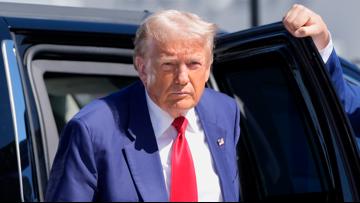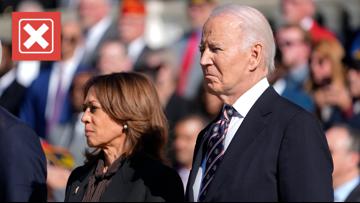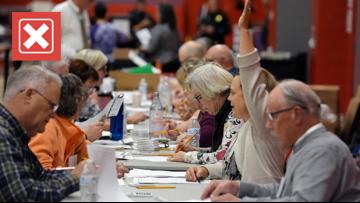After Donald Trump was elected 47th president of the United States, a theory emerged on social media suggesting tech billionaire Elon Musk’s Starlink satellite internet technology was used to manipulate votes in Trump’s favor.
Musk has been a vocal supporter of Trump during the presidential election cycle and his super PAC spent around $200 million to help elect him.
Viral posts about Starlink, a subsidiary of Musk’s SpaceX company, circulating in the wake of the election claim the technology was used to count votes in swing states and rig the election. Other posts claim voting machines were “hooked up to” Starlink, which uses satellites to offer high-speed internet even in rural areas.
Many VERIFY readers, including Denise, emailed and texted us with questions about whether Musk’s Starlink internet was used to interfere with the presidential election results.
THE QUESTION
Was Elon Musk's Starlink internet used to interfere with the presidential election results?
THE SOURCES
- Statement from Jen Easterly, director of the federal government’s Cybersecurity and Infrastructure Security Agency (CISA)
- National Institute of Standards and Technology
- Brennan Center for Justice
- Ted Allen, Ph.D., associate professor of integrated systems engineering at The Ohio State University and expert with the MIT Election Lab
- Genya Coulter, senior elections analyst at the nonprofit OSET Institute
- Statements from election officials in Arizona, Georgia, Michigan, North Carolina, Nevada and Pennsylvania
- News report published on Nov. 12 by ABC30 News in Fresno
THE ANSWER
There is no evidence that Starlink internet was used to interfere with the presidential election results. Contrary to what many online claims suggest, the vast majority of voting equipment, including tabulators that count votes, is not connected to the internet.
WHAT WE FOUND
There is no evidence of widespread election interference tied to Starlink or any other group, federal officials confirmed.
Contrary to what online claims suggest, the vast majority of voting equipment – including tabulators used to count votes – is not connected to the internet, making it impossible for Starlink to manipulate vote counts. The lack of an internet connection is aimed at limiting cybersecurity risks during elections.
On Wednesday, Nov. 6, Jen Easterly, director of the federal government’s Cybersecurity and Infrastructure Security Agency (CISA), confirmed in a statement that the U.S. election was secure. The agency has “no evidence of any malicious activity that had a material impact on the security or integrity of our election infrastructure,” Easterly said.
Voters’ ballots are scanned and counted electronically in many parts of the country.
In some areas, voters use a computer to mark their ballot electronically and then get a printout that they insert into a scanner for counting. In other cases, a person casts their ballot electronically and a paper record is printed that summarizes the votes cast, the Associated Press explains.
Election officials in most states also review some ballots by hand and compare the results to machine counts in order to verify their accuracy, according to the Brennan Center for Justice.
The federal government’s National Institute of Standards and Technology recommends against connecting voting systems to the internet, saying they “will be exposed to online attacks.” VERIFY also did not find any evidence that devices used to count votes during the 2024 presidential election were connected to the internet through WiFi or Starlink satellites.
Due to various state laws and directives, “almost no voting equipment is connected to the internet,” Ted Allen, Ph.D., as associate professor of integrated systems engineering at The Ohio State University and expert with the MIT Election Lab, said.
A spokesperson for the OSET Institute, a U.S.-based nonprofit focused on global public election technology, innovation and security, agrees.
“...The vast majority, if not all, ballot marking devices and tabulators are not connected to the internet by any means – whether WiFi, mobile or Starlink satellites,” Genya Coulter, who serves as the OSET Institute’s senior elections analyst, said.
There are some jurisdictions in a few states that allow for ballot scanners in polling locations to transmit unofficial results, using a mobile private network, after voting has ended on Election Day and the memory cards containing the vote tallies have been removed, the AP reported.
VERIFY also looked at key swing states’ policies on voting equipment and internet connectivity.
In North Carolina, state law prohibits voting machines from being connected to the internet, the State Board of Elections says. There are no voting machines in the state that have a modem or modem chip, the elections board added.
Georgia’s voting machines also do not connect to the internet in order to “limit cybersecurity risks,” Secretary of State Brad Raffensperger's website says.
Arizona’s election systems that count votes are never connected to the internet, an official Secretary of State website says.
Michigan, Nevada and Pennsylvania also say their voting equipment or systems used to count votes are not connected to the internet. VERIFY reached out to officials in Wisconsin for information about voting equipment and internet connectivity, but did not hear back by the time of publication.
Some rural areas of California and Arizona used Starlink technology to access their voter databases, according to a local news report and the Arizona Secretary of State’s Office. But voting machines weren’t connected to Starlink internet in these cases.
In rural Tulare County, California, Starlink was used to provide internet access to election workers’ laptops and connect to their database, allowing them to check in voters or check their registration status, ABC30 News in Fresno reported on Nov. 12.
"Those voting check-in laptops are in no way connected to the voting system. No way connected to the vote, tabulation or voting process other than making sure that that voter is a registered voter within our county," Stephanie Hill, the systems and procedures analyst for the Tulare County Registrar of Voters, told ABC30 News.
Arizona also deployed Starlink systems in three rural counties – Coconino, Apache and Navajo – to “support electronic pollbook synchronization,” a spokesperson for the Secretary of State’s office said.
The Council of State Governments defines a pollbook as “an official register of electors entitled to vote at an election” that is “used to verify and check in voters prior to issuing them a ballot.”
“Poll books have nothing to do with tabulators,” and the pollbook devices “never record or tally votes,” Coulter confirmed.
This isn’t the first time a similar election fraud conspiracy theory has garnered attention. After the 2020 presidential election, Trump’s team and other people online pushed false claims that Italian satellites were used to change vote totals.
That conspiracy theory was “quickly debunked,” Coulter said.












